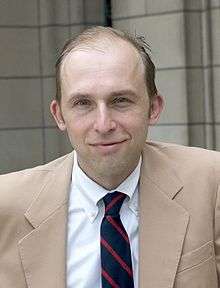Edward L. Widmer
Edward (Ted) Ladd Widmer (born 1963) is an American historian, writer, librarian and musician who served as a speechwriter in the Clinton White House.

Ted Widmer obtained an A.B. in the history and literature of France and the United States, an A.M. in history, and a Ph.D. in the history of American civilization from Harvard University. At Harvard, he was an editor at the Harvard Lampoon. In 1990, Widmer's research on the origin of baseball was featured in The New York Times.[1] In 1992 he married Mary Frederica Rhinelander, a printmaker and figurative artist.[2] Widmer was appointed lecturer on history and literature at Harvard University from 1993 until 1997. From 1995 until 1997 he played guitar and vocals in a Boston hard rock band, the Upper Crust.[3]
From 1997 to 2001, he worked in the White House as a special assistant to President Bill Clinton, foreign policy speech writer and Senior Advisor for Special Projects, which involved advising on history and scholarship related issues. He later conducted extensive interviews with Clinton while the former president was writing his autobiography.
He was the first director of the C.V. Starr Center for the Study of the American Experience[4] from 2001 to 2006 and an associate professor of history at Washington College from 2001. While there he created the George Washington Book Prize, an annual award given to the best book on the founding fathers. On July 1, 2006 he was appointed Director and Librarian of the John Carter Brown Library at Brown University, where he led efforts to digitize the library's holdings, and raised funding to save Haitian libraries in the wake of the 2010 earthquake.[5][6] From 2012 to 2013, Widmer was a senior advisor to Secretary of State Hillary Clinton. Between 2010 and 2015, he helped to create and often contributed to The New York Times "Disunion," a digital history of the Civil War. In October, 2016, Widmer was appointed Director of the Kluge Center at the Library of Congress.[7]
In 2018, he joined the faculty of Macaulay Honors College where he has taught courses on Walt Whitman and The People of New York.[8] In the fall of 2020 he will be teaching a new course on the upcoming US presidential election, Decision 2020: The Election in Real Time. Widmer wrote a history of Abraham Lincoln's journey to Washington, DC for his first inauguration entitled Lincoln on the Verge: Thirteen Days to Washington that was published in April 2020 by Simon & Schuster. He serves on boards of the Harvard Lampoon, Massachusetts Historical Society and the New England Quarterly.
His parents are Eric Widmer and Ellen B. Widmer. His father taught Chinese history and became Dean of Admissions and financial aid at Brown University before going on to lead Deerfield Academy and King's Academy, a school in Jordan, founded by King Abdullah.[9] His mother is Mayling Soong Professor of Chinese Studies; Professor of East Asian Studies at Wellesley College. His grandmother, Carolyn Ladd Widmer, was the first Dean of the University of Connecticut School of Nursing. His great-great grandfather, Cyrus Hamlin, founded Robert College in Istanbul.
Books
- Young America: The Flowering of Democracy in New York City (1999) (winner of the 2001 Washington Irving Prize)
- Campaigns: A Century of Presidential Races (2001) (co-author with Alan Brinkley)
- Martin Van Buren (2004)
- Ark of the Liberties: America and the World (2008) (a history of U.S. foreign policy)
- Listening In: The Secret White House Recordings of John F. Kennedy (2012) (co-author with Caroline Kennedy)
- Brown: The History of an Idea (2015)
- New York Times: Disunion: A History of the Civil War (2016) (co-editor with Clay Risen and George Kalogerakis)
- Lincoln on the Verge: Thirteen Days to Washington (2020)
References
- "Cooperstown? Hoboken? Try New York City." The New York Times.
- "Ms. Rhinelander, Edward Widmer New York Times, September 6, 1992.
- "Ted Widmer: A Short Biography." Washington Post, June 18, 2010.
- About the C.V. Starr Center Archived 2011-07-19 at the Wayback Machine - Washington College
- "Edward L. Widmer named new Director of John Carter Brown Library Brown University Press Release, January 10, 2006.
- "Haitian librarian joins JCB" Brown Daily Herald, February 2, 2010
- "Edward L. Widmer appointed Director of the Kluge Center Library of Congress Press Release", September 29, 2016.
- "Ted Widmer | Macaulay Honors College". macaulay.cuny.edu. Retrieved 2019-01-03.
- "Deerfield in the Desert"
External links
| Wikimedia Commons has media related to Edward L. Widmer. |